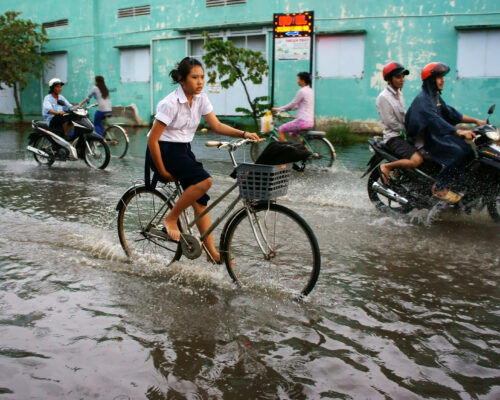Clean Energy Financing
Wind Energy in Vietnam – Opportunities and Potential
Vietnam has already established itself as one of the world's most notable clean energy success stories. However, to retain that crown, the country needs to incentivise foreign financiers.

Energy Transition Technologies: Deficiencies of the Japan-led Guidelines
Recent guidelines on transition technologies for Asia, influenced by Japanese energy policies, promote CCUS and ammonia co-firing in the power sector. As a result, they risk derailing the decarbonisation efforts of SEA countries and the financing institutions investing in transition technologies.
South Africa’s ‘Just Energy Transition Partnership’: Lessons For Asian Countries
The South African JETP marks a groundbreaking moment for global energy financing. It has set the stage for a new climate-progress model that can unite developed and developing countries, as well as public and private financiers, on the path towards a just energy transition.
COP27 Finance Day: Expectations and Outcomes
COP27's Finance Day didn't exactly provide many reasons for excitement. It ended with more promises than actual progress, showing a lack of solidarity with vulnerable nations, especially from the world's biggest polluters.
Using Transition Bonds For Ammonia and Blue Hydrogen Projects: The Risks For Investors and the Issuing Companies
Using transition bonds to fund blue hydrogen and ammonia projects risks extending the climate crisis. But, more importantly, it tarnishes the idea of climate financing at a time when it is needed the most.
COP27 Egypt and the Road to Net-Zero
COP27 shouldn't be yet another conference where promises are broken without consequences. Instead, it should be the stage where global leaders start making actual progress in protecting the most vulnerable to climate change.

COP27 Priorities: Climate Change Adaptation and Mitigation
Mitigation is critical to minimise the risk of climate change's worst impacts, but failing to fund adaptation will take a toll on the most vulnerable. Both aspects should be priorities for COP27.
Climate Change Impacts Are Worsening in 2022 and COP27 and G20 Leaders Need to Respond
A new study reveals the massive proportion of climate disasters all across the world, proving that no country is safe from climate change's impacts. Climate financing for mitigation, adaptation and loss and damage should be central to the COP27 and G20 meeting agendas later this year.
Green Bonds: Sustainable Financing Tools or a Greenwashing Weapon?
In a bid to reduce greenwashing possibilities, the EU now requires increased transparency and strict reporting for sustainable bonds. However, the rest of the world is still dragging its feet, leaving the door open for greenwashing on both state and corporate levels.
MHI First Transition Bond Program – All You Need to Know
Instead of the innovative green financing mechanism they were supposed to be, transition bonds have become the perfect tool for greenwashing. MHI's first transition bonds program can either accelerate the company's net-zero efforts or further distance it from carbon neutrality. The key is in MHI's hands.
The Cost of Sustainability for Asia is Lower than the Benefits
As one of the most vulnerable regions to climate change, Asia has virtually nothing to lose from the looming energy transition. While investments are needed, the cost of sustainability is negligible compared to what the continent stands to gain.
The Economic Benefits of Renewable Energy for Asia: Crunching the Numbers
The transition from fossil fuels to renewable energy in Asia will unleash massive economic benefits, including expanding the job market, ensuring steady GDP gains and hedging the unpredictable fossil fuel prices.
Importance of Climate Finance and Climate Change to Strengthen Global Solidarity
Analysts are clear: climate financing is insufficient and unevenly distributed. Developing Asian countries, especially those in the south, have to be the most concerned, considering they are the most vulnerable to climate crisis impacts.
Most Popular
Categories
-
10
-
34
-
126
-
4
-
17
-
46
-
52
-
11
-
10
-
15
-
24
-
6
-
1
-
5
-
6
-
283
-
200
-
17
-
24
-
1
-
1
-
23
-
41
-
44
-
88
-
18
-
86
-
41
-
17
-
11
-
43
-
54
-
86
-
299
-
22
-
44
-
36
-
11
-
42
-
36


